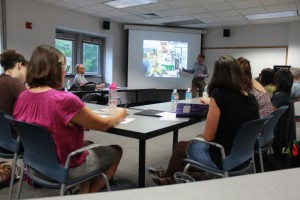T he future success of today’s students hinges more than ever on their ability to think critically, and creatively manipulate technology, media and data. Helping them achieve this level of fluency is the goal of a new project led by Carnegie Mellon University and sponsored by The Heinz Endowments.
he future success of today’s students hinges more than ever on their ability to think critically, and creatively manipulate technology, media and data. Helping them achieve this level of fluency is the goal of a new project led by Carnegie Mellon University and sponsored by The Heinz Endowments.
“Our vision is that students will be using technology, multimedia and data as raw materials for supporting their decisions or expressing their creativity,” said Jessica Pachuta, a project manager for the CMU Robotics Institute’s CREATE (Community Robotics, Education and Technology Empowerment) Lab. “While schools have concentrated on technical and data literacy, we want students to achieve fluency.”
Twelve teachers from eight Pittsburgh-area school systems explored how to apply the concept of data and technology fluency in their schools during workshops this summer with Carnegie Mellon researchers, led by Pachuta, Jessica Kaminsky and Beatrice Dias. These educators, including librarians, represent grades 1-12 and teach subjects ranging from physics to physical education. They represent the Pittsburgh, Quaker Valley, Plum, Freeport, Carlynton, Allegheny Valley and Bethel Park school systems and the Holy Family Academy.
“These teachers are really entering the design space with us,” said Kaminsky, one of three project managers on the CREATE team. With support from the 14-month, $593,000 planning grant from The Heinz Endowments, the group will develop a pilot program for local schools. This will include developing tools and methods that enable students to use data and technology for asking questions and exploring their environment, for telling cohesive stories, and for articulating opinions and arguments.
The pilot program will be implemented the following school year. West Liberty University will serve as a thought partner for the project, lead professional development efforts and support the cohort of educators as they investigate how fluency can be incorporated into their classrooms.
The CREATE Lab will provide access to visualization software for making sense out of large datasets, to virtual reality tools and to other technologies and expertise. The lab has run a number of projects, including a satellite network involving West Liberty and other area schools that make technology available to area students or support professional development of teachers.